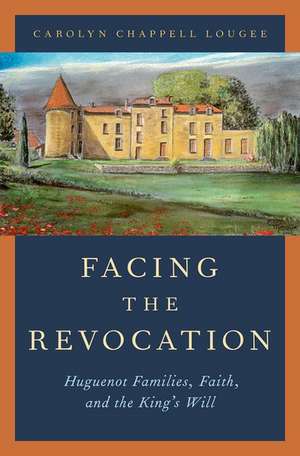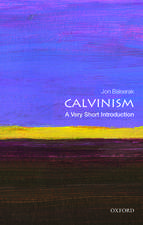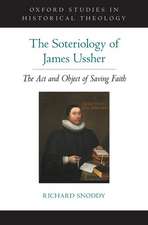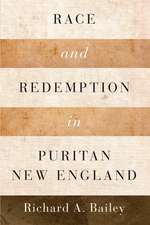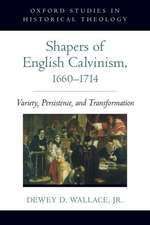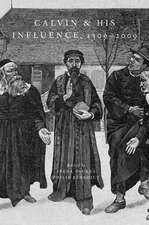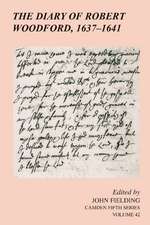Facing the Revocation: Huguenot Families, Faith, and the King's Will
Autor Carolyn Chappell Lougeeen Limba Engleză Hardback – 8 dec 2016
| Toate formatele și edițiile | Preț | Express |
|---|---|---|
| Paperback (1) | 232.89 lei 10-16 zile | |
| Oxford University Press – 8 sep 2020 | 232.89 lei 10-16 zile | |
| Hardback (1) | 455.83 lei 31-37 zile | |
| Oxford University Press – 8 dec 2016 | 455.83 lei 31-37 zile |
Preț: 455.83 lei
Preț vechi: 582.13 lei
-22% Nou
Puncte Express: 684
Preț estimativ în valută:
87.22€ • 91.31$ • 72.17£
87.22€ • 91.31$ • 72.17£
Carte tipărită la comandă
Livrare economică 25-31 martie
Preluare comenzi: 021 569.72.76
Specificații
ISBN-13: 9780190241315
ISBN-10: 0190241314
Pagini: 486
Ilustrații: 50 illus.
Dimensiuni: 236 x 155 x 36 mm
Greutate: 0.84 kg
Editura: Oxford University Press
Colecția OUP USA
Locul publicării:New York, United States
ISBN-10: 0190241314
Pagini: 486
Ilustrații: 50 illus.
Dimensiuni: 236 x 155 x 36 mm
Greutate: 0.84 kg
Editura: Oxford University Press
Colecția OUP USA
Locul publicării:New York, United States
Recenzii
This meticulously reconstructed family history is a valuable contribution to research, which fits in the recent trends among scholars of the Huguenots. The author rightfully asserts that through investigation of particular and private experiences of many different Huguenots around the Revocation, it will eventually be possible to compile a general picture of these experiences and analyze them. Given that there are numerous Huguenot memoirs and autobiographies preserved, similar projects would be of great interest for the research community, because they offer a different outlook than the traditional history and allow the researcher to dive into the world of the individual facing a major turning point in history.
This a compelling, if complicated history. Lougee conveys it with compassion and purpose, all the while maintaining an enquiring eye and critical distanceShe relates with care and nuance the story of Marie de La Rochefoucauld, a Reformed matriarch whose determination and dedication combined with careful planning and financial acumen to not simply save, but in fact advance her family amid the appalling circumstances of religious oppression. The result is a highly original set of insights into the uncertainties and burdens that French Protestants encountered as they confronted the royal proscription of their ancestral religion....Throughout her study, Lougee reveals and investigates the female voice, which has so long been muted (though not entirely absent) in accounts of the Revocation and the Refuge.
Carolyn Chappell Lougee's book sheds light on the complex experiences which led one French noble family to fragment in response to the Revocation, compelling many of them to start new lives (or end them) in the Netherlands, England and Ireland.The afterword, where Lougee tells the reader how she came across the first fragments of the archive that she has so lovingly reconstructedis an absorbing narrative which wins the reader's admiration for her persistence in tracking down the papers, which had become as scattered as the Huguenots themselves.
Thanks to Lougee's relentless archival digging this book succeeds like no other in capturing the human voice of the Huguenot exile experienceLougee's deeply moving account of their decisions and experiences provides an unparalleled and personal insight into the complexities faced by Huguenots that is so often lacking in current scholarship on early modern refugees
A masterful study of a provincial nobility and a Protestant communityLougee's tracing of the Champagnés into exile rewrites our understanding of the RefugeReading this excellent book in the midst of the world's current refugee crisis gives it a particular resonance. Of course, addressing that issue is not Lougee's purpose, but one can only hope that, in time, modern refugees will find as thorough and gifted an historian as she.
A significant scholarly contribution that holds rich rewards for readers, and a compelling account of the experiences of one family among so many confronting a pivotal moment in early modern French history.
The Champagné family are unusually well documented. This is partly the luck of survival, but finding this material and interpreting it required truly remarkable scholarship. Lougee's dissection of both Protestant and Catholic narratives is brilliant. Both technically and stylistically, this is superb historical writing...The story is wonderfully told, skillfully combining historical empathy with incisive, no-nonsense analysis of motives and of the consequences of individual decisions. Lougee challenges or nuances a number of myths that remain current in Huguenot memory and in some scholarly works: the emphasis on state persecution and on purely religious motivations for departure from France; the belief that the Protestant nobility massively abandoned the Reformed religion; and the idea that emigration marked a complete break with the past.
This a compelling, if complicated history. Lougee conveys it with compassion and purpose, all the while maintaining an enquiring eye and critical distanceShe relates with care and nuance the story of Marie de La Rochefoucauld, a Reformed matriarch whose determination and dedication combined with careful planning and financial acumen to not simply save, but in fact advance her family amid the appalling circumstances of religious oppression. The result is a highly original set of insights into the uncertainties and burdens that French Protestants encountered as they confronted the royal proscription of their ancestral religion....Throughout her study, Lougee reveals and investigates the female voice, which has so long been muted (though not entirely absent) in accounts of the Revocation and the Refuge.
Carolyn Chappell Lougee's book sheds light on the complex experiences which led one French noble family to fragment in response to the Revocation, compelling many of them to start new lives (or end them) in the Netherlands, England and Ireland.The afterword, where Lougee tells the reader how she came across the first fragments of the archive that she has so lovingly reconstructedis an absorbing narrative which wins the reader's admiration for her persistence in tracking down the papers, which had become as scattered as the Huguenots themselves.
Thanks to Lougee's relentless archival digging this book succeeds like no other in capturing the human voice of the Huguenot exile experienceLougee's deeply moving account of their decisions and experiences provides an unparalleled and personal insight into the complexities faced by Huguenots that is so often lacking in current scholarship on early modern refugees
A masterful study of a provincial nobility and a Protestant communityLougee's tracing of the Champagnés into exile rewrites our understanding of the RefugeReading this excellent book in the midst of the world's current refugee crisis gives it a particular resonance. Of course, addressing that issue is not Lougee's purpose, but one can only hope that, in time, modern refugees will find as thorough and gifted an historian as she.
A significant scholarly contribution that holds rich rewards for readers, and a compelling account of the experiences of one family among so many confronting a pivotal moment in early modern French history.
The Champagné family are unusually well documented. This is partly the luck of survival, but finding this material and interpreting it required truly remarkable scholarship. Lougee's dissection of both Protestant and Catholic narratives is brilliant. Both technically and stylistically, this is superb historical writing...The story is wonderfully told, skillfully combining historical empathy with incisive, no-nonsense analysis of motives and of the consequences of individual decisions. Lougee challenges or nuances a number of myths that remain current in Huguenot memory and in some scholarly works: the emphasis on state persecution and on purely religious motivations for departure from France; the belief that the Protestant nobility massively abandoned the Reformed religion; and the idea that emigration marked a complete break with the past.
Notă biografică
Carolyn Chappell Lougee is Frances and Charles Field Professor in History Emerita at Stanford University.
